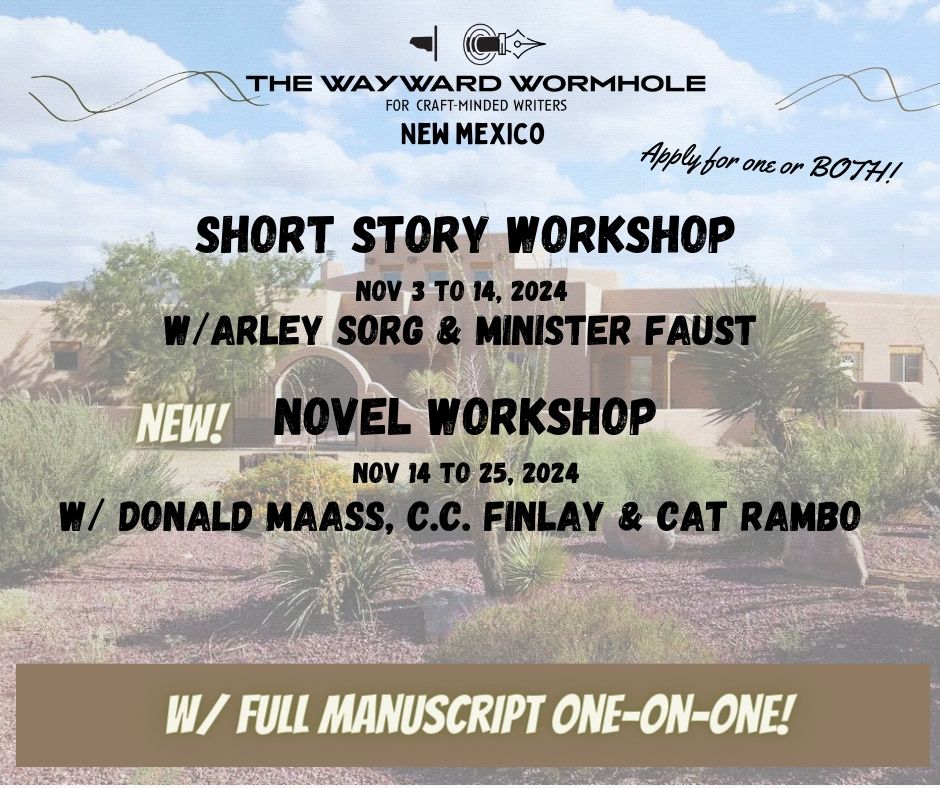

The Rambo Academy for Wayward Writers is pleased to announce the second annual Wayward Wormhole, this time in New Mexico. Join us for the short story workshop to study with Arley Sorg and Minister Faust, or the novel workshop with Donald Maass, C.C. Finlay, and Cat Rambo.
Both intensive workshops will be hosted at the Painted Pony ranch in Rodeo, New Mexico. The short story workshop runs November 4-12, 2024, and the novel workshop runs November 15 through 24, 2024.
The Rambo Academy for Wayward Writers has been in existence for thirteen years, serving hundreds of students who have gone on to win awards, honors, and accolades, including Nebula, Hugo, and World Fantasy Awards. “I attended Clarion West, and have taught at multiple workshops now,” says Academy founder Cat Rambo. “While others have delivered the gold standard, I decided to stretch to the platinum level and deliver amazing workshops in equally amazing settings. Last year’s was a castle in Spain, this year a fabulous location in southwestern America. And wait till you hear what we’ve got cooked up for 2025!”
More details about these exciting workshops and how to apply!
...
 I recently attended a writing workshop with Kim Stanley Robinson via the Locus Writers Workshop series. The workshop was in Oakland, California (where I live), near the Locus offices, and Kim Stanley Robinson is one of my favorite authors. Signing up was a no-brainer.
I recently attended a writing workshop with Kim Stanley Robinson via the Locus Writers Workshop series. The workshop was in Oakland, California (where I live), near the Locus offices, and Kim Stanley Robinson is one of my favorite authors. Signing up was a no-brainer.
Over the course of the day, Kim Stanley Robinson (who goes by Stan) was generous and helpful. His advice was insightful, and sometimes counterintuitive. And there was a lot of it; he’s written for decades and has no shortage of opinions on craft, the writing life, MFA programs, and reviewers. I took copious notes.
Five weeks after the workshop, with time to synthesize, some of that advice stood out. Here are some of the highlights:
...

Overall:
Characters:
World:
Enjoy this writing advice and want more content like it? Check out the classes Cat gives via the Rambo Academy for Wayward Writers, which offers both on-demand and live online writing classes for fantasy and science fiction writers from Cat and other authors, including Ann Leckie, Seanan McGuire, Fran Wilde and other talents! All classes include three free slots.
Prefer to opt for weekly interaction, advice, opportunities to ask questions, and access to the Chez Rambo Discord community and critique group? Check out Cat’s Patreon. Or sample her writing here.
...

Speaking of the productive part of those goals, I just sent off the last batch of feedback to someone on their NanoWriMo novel. I’ll remind folks that this is the last week to do so if you want to take advantage of my editing offer for NaNoWriMo novels mentioned here: http://www.kittywumpus.net/blog/2011/12/06/nanowrimo-what-now/
A couple of people have asked about my doing an edit of their stories for workshops like Clarion West or Clarion. I am willing to do a look over of the developmental edit type, where I suggest to you what needs to be amplified, eliminated, or otherwise changed, but I won’t do a sentence by sentence one, since you need to be getting in on your own merits, in my opinion.
Next week I’ll be announcing the next round of classes – stay tuned for some cool possibilities (in my opinion!)
...
It’s the time of year when people are contemplating submissions to workshops like Clarion, Clarion West, Odyssey, Taos Toolbox, and a myriad of others. Here’s seven tips to help with yours.
Enjoy this writing advice and want more like it? Check out the classes Cat gives via the Rambo Academy for Wayward Writers, which offers both on-demand and live online writing classes for fantasy and science fiction writers from Cat and other authors, including Ann Leckie, Seanan McGuire, Fran Wilde and other talents! All classes include three free slots.
Prefer to opt for weekly interaction, advice, opportunities to ask questions, and access to the Chez Rambo Discord community and critique group? Check out Cat’s Patreon. Or sample her writing here.
...
Want access to a lively community of writers and readers, free writing classes, co-working sessions, special speakers, weekly writing games, random pictures and MORE for as little as $2? Check out Cat’s Patreon campaign.

"(On the writing F&SF workshop) Wanted to crow and say thanks: the first story I wrote after taking your class was my very first sale. Coincidence? nah….thanks so much."

(science fiction, short story) The bots were going to run Linus out of room soon, if they didn’t scavenge away some piece vital to the ship’s functioning and leave him choking on vacuum first. He didn’t think anyone else had these problems with their ship bots. Galina would say it was his own fault for encouraging them.


This site is protected by reCAPTCHA and the Google Privacy Policy and Terms of Service apply. This site is a participant in the Amazon Services LLC Associates Program, an affiliate advertising program designed to provide a means for sites to earn advertising fees by advertising and linking to Amazon.com.